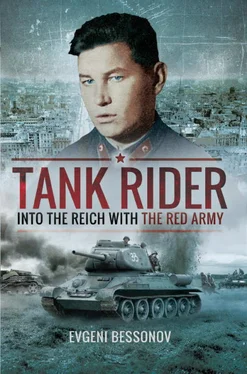The commanders did not dare to mount a night attack, so the attack was shifted to the next morning. At dawn the battalion – all that was left of its three companies – started to advance through the forest to the left of the road. We did not know anything about the enemy. At first everything was nice and quiet, no shots were fired at us, the enemy did not see us, and we did not see the enemy. However, this did not last for long, as the enemy spotted us and opened rifle and machine-gun fire. We returned fire and advanced forward in short rushes.
The outnumbered German infantry retreated, or rather fled from our attack. However, we came under fire from three German assault guns, which turned out to be some 50 metres from us. We had to take cover behind trees, as the assault guns fired at almost every single soldier. My orderly and I were lying under a tree, which was hit by a shell, a metre from the ground. We were shell-shocked, the tree was cut down, but we remained unharmed and sneaked to another tree. We were lucky again, not for the first time. We did not know what to do, as the tanks did not support us, staying far behind, but the 3rd company commander, Kostenko, quickly came up with a solution. He brought a heavy JS-2 tank almost to our line and indicated targets – the assault guns – to the crew. The tank fired two shots from its heavy gun (122 mm), and one assault gun literally fell apart, while the second round penetrated two assault guns at once. I had never seen such a ‘miracle’ before. Our way was free. The battalion advanced a bit further through the forest and the enemy was nowhere to be seen. Our tanks caught up with us, we were ordered to mount the tanks, and we drove on.
Overcoming the stubborn resistance of the enemy, during the night of 11 February our battalion with the other battalions of the Brigade crossed the Bober river and then crossed the Neisse river on 16 February. We were already some 105 or 110 kilometres from Berlin. The Neisse was deep and wide in the place where we crossed it. There was a good multi-ton bridge across the river, but it was boobytrapped, and German battle engineers were waiting for the order to blow the bridge up. However, guys from the Brigade’s scout company captured the bridge and killed all the battle engineers – they received help from a Russian girl that the Germans must have known – she worked at the farm next to the bridge. Thus we were able to cross the river on the bridge and set up defences on the left flank of the Brigade, no more than 100 metres from the river. The 2nd and the 3rd battalions of the Brigade were in defence to the right of us, some 250 metres from the river. We did not have enough forces to advance any further.
Our company had just ten or fifteen soldiers when it arrived at the bridgehead at Neisse. Guschenkov had probably just three or five soldiers with one Maxim machine-gun left. Besides this, the company had company commander Vyunov, platoon leaders Guschenkov and me, Sergeant Major Bratchenko, medic ‘Brotherly Heart’, clerk Chulkin and a company commander’s orderly. The company’s total strength was just 22 or 23 men: at the beginning of the operation on 12 January, 1945, the company had had up to 100 men. Our company’s losses were up to 80% of personnel. The other companies were not in a better position. Company commander Nikolai Chernyshov was heavily wounded, platoon leaders Shakulo and Mikheev were lightly wounded. We earned our victory at a high price, a very high price. It was not only our battalion that suffered significant losses, but also the other two battalions of the Brigade, as well as the tank regiment. All tanks were out of action, just three or four tanks could still move, but they could not fire – their main guns were broken. However, even these tanks could make it to our bridgehead on the Neisse river, in order to make a show of armour. This contained the Germans to a certain extent – tanks are still tanks. Brigade commander Colonel Turkin was at that time recovering from a wound in a hospital. The Brigade was under the brigade chief of staff, Lieutenant Colonel Arkadi Arkhipov. Turkin was wounded in the following incident: in front of a village we were caught by German fire; tanks stopped, tank riders dismounted, and we moved forward a bit and lay down. I had to clarify the situation, find out where the enemy was and what forces opposed us. Some other officers were with me at that point. I sent several men to find out what was going on – I did not like to attack without knowing anything about the enemy. The scout party returned and reported that they did not see the enemy, but Germans had fired on them from basements and house windows. My three tanks bluntly refused to continue the attack, but the main body of the Brigade was about to arrive. While I was thinking whether I should attack the enemy, it drove up. Brigade commander Colonel Turkin and the Brigade’s tank regiment commander, Major Stolyarov, arrived at the scene. I reported the reason for our stop, but they did not believe me. Turkin told me: ‘You got scared by a single Fritz, there is no one there! You just thought you saw someone. Forward, Bessonov!’ They got into their APC and as soon as they had driven some 100 metres, a Panzerfaust team knocked out their APC. Both Turkin and Stolyarov were wounded, while the APC crew was killed. Our tanks arrived and opened fire from main guns; the company went forward, firing on the move. The enemy fled.
The bridgehead at the Neisse river was very small; it was exposed even to machine-gun fire, while German artillery fired at us day and night. Soldiers talked about an armoured train firing at us, but I was not sure about that. We did not have sufficient force to extend the bridgehead, and although the Germans brought up reinforcements, their infantry was not numerous either. They did not bring any tanks, as they must have suffered too heavy losses. We stayed for some five or six days at the bridgehead, and the Germans gave us no respite day or night. The Germans were in bushes not more than 50 metres from our company, and threw themselves at us several times, day and night. But the soldiers of my platoon opened heavy fire every time, while Lieutenant Guschenkov’s machine-gun cut them down without mercy and they had to fall back with losses. The air force bombed us during the day, dropping bombs at the bridge, but fortunately for us they all missed. The Germans even launched torpedoes down the river to hit the bridge. The torpedoes were quite powerful, but they all missed the bridge, hit the banks of the river and exploded not far from the bridge. The Germans used a new weapon against our infantry, at least I had not seen such a weapon before. They dropped boxes or containers from the planes: in mid-air the boxes opened into two halves and small bombs that resembled Russian F-1 grenades rained on us from there. They could cover quite a vast area. Again, fortunately for us they missed us, apparently they did not know exactly where we were. We could not dig in, as the the water table was too high, we only dug skirmisher’s trenches, not deeper. Eventually, everything worked out fine and we did not have losses.
My orderly Andrey Drozd and I slept in turns; not far from the riverbank we found concrete rings for facing wells and they served us as a good shelter from shell and bomb splinters. This is where we rested when Germans did not attack. Our rest was a couple of hours of sleep, all the other time we were awake. Apparently, the Germans suffered hellishly from Guschenkov’s machine-guns, which fired at them at point-blank range, cutting down the attacking soldiers. As a result, the Fritzes ceased their attacks on our company and it was quiet for a couple of days. Soldiers could calmly put themselves in order, at least, those who wanted to could shave or wash their faces. The battalion’s field kitchen would come to us across the bridge before dawn and in twilight in the evening, and all day long we had to eat the remains of captured German food. When the Germans had calmed down, company’s Sergeant Major Mikhail Bratchenko organized lunch during the day. They stayed in a small house together with company commander Grigori Vyunov not far from the front line, and set up kitchen there. The company’s medic, clerk and orderly also stayed there, Alexander Guschenkov sometimes also visited there. He already had four or five wounds and this was the first operation in which he was not wounded.
Читать дальше












